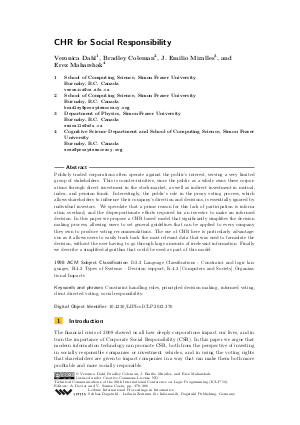CHR for Social Responsibility
Authors Veronica Dahl, Bradley Coleman, J. Emilio Miralles, Erez Maharshak
-
Part of:
Volume:
Technical Communications of the 28th International Conference on Logic Programming (ICLP'12) (ICLP 2012)
Part of: Series: Leibniz International Proceedings in Informatics (LIPIcs)
Part of: Conference: International Conference on Logic Programming (ICLP) - License:
 Creative Commons Attribution-NoDerivs 3.0 Unported license
Creative Commons Attribution-NoDerivs 3.0 Unported license
- Publication Date: 2012-09-05
File

PDF
LIPIcs.ICLP.2012.370.pdf
- Filesize: 391 kB
- 11 pages
Document Identifiers
Subject Classification
Keywords
- Constraint handling rules
- principled decision making
- informed voting
- client directed voting
- social responsibility.
Metrics
- Access Statistics
-
Total Accesses (updated on a weekly basis)
0Document
0Metadata
Abstract
Publicly traded corporations often operate against the public's interest, serving a very limited group of stakeholders. This is counter-intuitive, since the public as a whole owns these corporations through direct investment in the stock-market, as well as indirect investment in mutual, index, and pension funds. Interestingly, the public's role in the proxy voting process, which allows shareholders to influence their company's direction and decisions, is essentially ignored by individual investors. We speculate that a prime reason for this lack of participation is information overload, and the disproportionate efforts required for an investor to make an informed decision. In this paper we propose a CHR based model that significantly simplifies the decision making process, allowing users to set general guidelines that can be applied to every company they own to produce voting recommendations. The use of CHR here is particularly advantageous as it allows users to easily track back the most relevant data that was used to formulate the decision, without the user having to go through large amounts of irrelevant information. Finally we describe a simplified algorithm that could be used as part of this model.
Cite As Get BibTex
Veronica Dahl, Bradley Coleman, J. Emilio Miralles, and Erez Maharshak. CHR for Social Responsibility. In Technical Communications of the 28th International Conference on Logic Programming (ICLP'12). Leibniz International Proceedings in Informatics (LIPIcs), Volume 17, pp. 370-380, Schloss Dagstuhl – Leibniz-Zentrum für Informatik (2012)
https://doi.org/10.4230/LIPIcs.ICLP.2012.370
BibTex
@InProceedings{dahl_et_al:LIPIcs.ICLP.2012.370,
author = {Dahl, Veronica and Coleman, Bradley and Miralles, J. Emilio and Maharshak, Erez},
title = {{CHR for Social Responsibility}},
booktitle = {Technical Communications of the 28th International Conference on Logic Programming (ICLP'12)},
pages = {370--380},
series = {Leibniz International Proceedings in Informatics (LIPIcs)},
ISBN = {978-3-939897-43-9},
ISSN = {1868-8969},
year = {2012},
volume = {17},
editor = {Dovier, Agostino and Santos Costa, V{\'\i}tor},
publisher = {Schloss Dagstuhl -- Leibniz-Zentrum f{\"u}r Informatik},
address = {Dagstuhl, Germany},
URL = {https://drops.dagstuhl.de/entities/document/10.4230/LIPIcs.ICLP.2012.370},
URN = {urn:nbn:de:0030-drops-36374},
doi = {10.4230/LIPIcs.ICLP.2012.370},
annote = {Keywords: Constraint handling rules, principled decision making, informed voting, client directed voting, social responsibility.}
}
